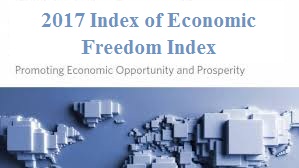India has been ranked 143 out of 186 economies in the annual Index of Economic Freedom 2017 released by top US based Think Tank, The Heritage Foundation.The Index measures the degree of economic freedom in the countries of the world.
- Hong Kong, Singapore and New Zealand are the top three nations in the Index respectively.
- The 2017 Index is the 23rd edition of the index.
Key highlights of the 2017 Index of Economic Freedom
As per the Washington’s No. 1 think tank, out of 186 economies India has been ranked at 143rd position with an overall score of 52.6 points, which is 3.6 points less than compared to 2016 when India ranked 123rd.
- India has been placed in the category of “Mostly Unfree” Economies in which the points ranges from 50.0-59.9.
- Among South Asian countries, only Afghanistan (163) and Maldives (157) were ranked
 below India. Nepal (125), Sri Lanka (112), Pakistan (141), Bhutan (107), and Bangladesh (128) surpassed India in economic freedom.
below India. Nepal (125), Sri Lanka (112), Pakistan (141), Bhutan (107), and Bangladesh (128) surpassed India in economic freedom. - China with a score of 57.4 points was placed at 111th position which is 5.4 points above the last year. United States has been ranked 17 with a score of 75.1 points.
- This year, forty-nine countries, the majority of which are developing countries but also including countries such as Norway and Sweden has achieved their highest-ever index scores.
- The overall world average score is 60.9 which is the highest recorded score in the 23-year history of the index.
India in the Index
The report has said that the bad performance of India is due to its uneven progress in the market oriented reforms.
- Though India has seen an average annual growth of about 7 percent over the last 5 years, but still the growth is not seen in the policies framed to preserve the economic freedom.
- The report stated that India has made significant presence in many areas through public-sector enterprises but in terms of private sector, it has a restrictive and burdensome regulatory environment that discourages the entrepreneurship which could otherwise have provided a broader private-sector growth.
- It said that though India has one of the most advanced technology and manufacturing sectors than any other in the world, it also has a less developed traditional sector that do not provide necessary freedom to the sector for growth.
- India is characterized by both, extreme wealth as well as too much poverty. The co-existence of the two different nature of the economy on the one hand leads India towards modernization, while on the other hand struggles to find path for inclusive development for its large and diverse population.
- India has a significant position in the global trade but the existence of corruption, underdeveloped infrastructure, and poor management of public finance weaken the overall development.
- However, the index has also praised the efforts of Indian Prime Minister Shri Narendra Modi for giving a new energy and strength to the Indian Foreign Policy. It said that Modi, who in June 2016 made his fourth visit to the US in two years, has strengthened bilateral ties particularly in defence cooperation.
About the Index of Economic Freedom
The Index of Economic Freedom is an annual index and ranking created by The Heritage Foundation and The Wall Street Journal in 1995 to measure the degree of economic freedom in the world’s nations.
- The index scores the 186 nations on ten factors of economic freedom, separated into four categories, using statistics from organizations like the World Bank, the International Monetary Fund, Economist Intelligence Unit and Transparency International.
- In each factor, countries are scored 0 to 100, with 0 being the least free and 100 the most free. A score of 100 signifies an economic environment or set of policies that is most conducive to economic freedom.
- Each nation is grouped in 5 different categories based upon the degree of economic freedom. These five categories includes, Free (80–100), Mostly Free (70.0–79.9), Moderately Free (60.0–69.9), Mostly Unfree (50.0–59.9) and Repressed (0–49.9).





